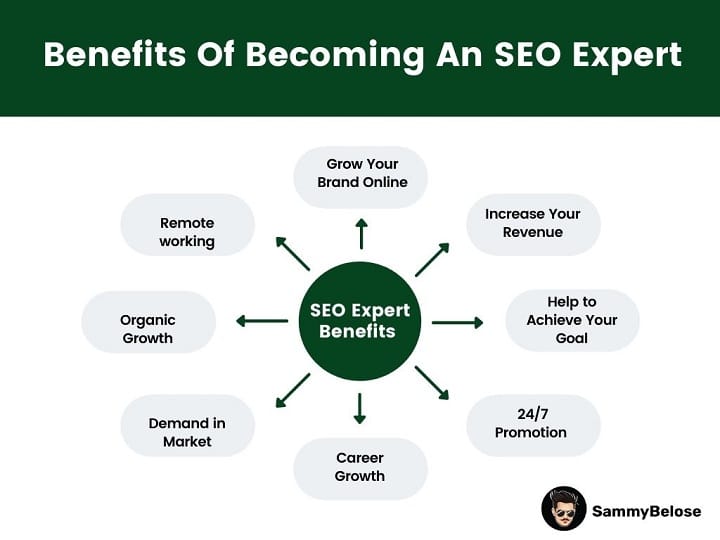An SEO expert is someone who specializes in search engine optimization, which is the practice of optimizing websites and online content to improve their visibility and ranking in search engine results pages (SERPs).
SEO experts have a deep understanding of the algorithms and ranking factors used by search engines, as well as the best practices for optimizing websites and content to meet these criteria. They can provide guidance on keyword research, content creation, website structure and design, link building, and other factors that can impact a website's search engine rankings.
SEO experts may work independently or as part of an agency or digital marketing team, and they may provide consulting services or hands-on optimization work. Their goal is to help businesses and individuals improve their online visibility and attract more organic traffic from search engines.
What is SEO?
SEO stands for "search engine optimization," which refers to the practice of optimizing websites and online content to improve their visibility and ranking in search engine results pages (SERPs).
Search engines like Google, Bing, and Yahoo use complex algorithms to evaluate and rank websites and content based on a variety of factors, including relevance, authority, popularity, and usability. SEO involves making changes to your website and content to align with these factors and improve your chances of ranking higher in search results.
Some common SEO techniques include:
Keyword research: identifying the keywords and phrases that people use to search for the products, services, or information you offer, and incorporating these keywords into your website and content.
On-page optimization: optimizing your website's structure, content, and metadata to make it easier for search engines to understand and index your pages.
Link building: acquiring links from other high-quality websites to improve your website's authority and credibility.
Content creation: creating high-quality, useful, and relevant content that meets the needs of your target audience and attracts organic traffic to your website.
Technical SEO: ensuring that your website is technically sound and meets search engine guidelines, such as having a mobile-friendly design, fast loading times, and secure HTTPS protocol.
SEO is an ongoing process, as search engine algorithms are constantly evolving and updating, and new competitors are always entering the market. As such, it requires ongoing effort and optimization to maintain and improve your search engine rankings over time.
What are the Benefits of SEO?
There are many benefits of SEO for businesses and individuals who want to improve their online presence and attract more organic traffic to their websites. Here are some of the key benefits of SEO:
Improved visibility and ranking: By optimizing your website and content for search engines, you can improve your visibility and ranking in search results pages. This can help you attract more organic traffic to your website, and increase your brand recognition and credibility.
Increased website traffic: The more visible your website is in search results, the more likely people are to click through to your site. SEO can help you attract more targeted, high-quality traffic to your website, which can result in more leads, sales, or conversions.
Better user experience: SEO involves optimizing your website's structure, content, and usability to make it more user-friendly and accessible. This can improve your website's overall user experience, and make it easier for people to find what they're looking for on your site.
Cost-effective marketing: Compared to other forms of digital marketing, such as paid advertising or social media marketing, SEO can be a more cost-effective way to attract organic traffic to your website over the long term.
Competitive advantage: If your competitors are not actively pursuing SEO, then you can gain a significant competitive advantage by investing in SEO and improving your website's search engine visibility and ranking.
Measurable results: SEO provides measurable results, so you can track your website's search engine ranking, traffic, and conversions over time, and make data-driven decisions about your optimization strategies.
Overall, SEO is a powerful digital marketing strategy that can help you improve your online visibility, attract more traffic to your website, and achieve your business goals.
Benefits of Becoming an SEO Expert
There are many benefits of becoming an SEO expert, including:
High demand: As more and more businesses recognize the importance of search engine optimization for their online presence, there is a growing demand for skilled SEO professionals who can help them improve their search engine rankings and attract more organic traffic to their websites.
Varied career opportunities: SEO expertise is in demand across a wide range of industries, including e-commerce, digital marketing, web development, and content creation. As an SEO expert, you may work in-house for a company, as part of a digital marketing agency, or as a freelance consultant, giving you flexibility in your career path.
Continuous learning: SEO is a constantly evolving field, with new search engine algorithms, ranking factors, and optimization strategies emerging all the time. As an SEO expert, you will have the opportunity to stay up-to-date with the latest trends and best practices, and continuously expand your knowledge and skillset.
High earning potential: SEO expertise is highly valued in the job market, and as a result, SEO professionals can command high salaries and competitive compensation packages. Additionally, freelance SEO consultants can charge high hourly rates for their services.
Creative expression: SEO requires a balance of technical and creative skills, allowing you to express your creativity through content creation, website optimization, and other elements of your work.
Overall, becoming an SEO expert can be a rewarding and lucrative career path, offering opportunities for growth, continuous learning, and professional development.
Job Responsibilities of an SEO Expert
The job responsibilities of an SEO expert may vary depending on the specific company, industry, or client they work with. However, some common responsibilities of an SEO expert may include:
Conducting keyword research to identify high-traffic, relevant keywords and phrases for optimization.
Analyzing website structure, content, and performance to identify areas for improvement.
Developing and implementing SEO strategies and tactics, such as on-page optimization, technical optimization, content creation, and link building.
Monitoring website traffic, search engine rankings, and other SEO metrics to track progress and identify opportunities for improvement.
Staying up-to-date with the latest search engine algorithms, ranking factors, and optimization best practices, and adjusting strategies as needed.
Collaborating with content creators, web developers, and other stakeholders to ensure website optimization is integrated into all aspects of online marketing.
Creating and presenting reports on website performance and SEO activities to stakeholders, such as clients, executives, or marketing teams.
Conducting competitive analysis to identify trends, opportunities, and potential threats to a website's search engine rankings and traffic.
Providing guidance and training to colleagues or clients on SEO best practices and optimization strategies.
Overall, the job responsibilities of an SEO expert involve a combination of technical and strategic skills, as well as the ability to work collaboratively with others and adapt to changing market conditions and search engine algorithms.
How To Become SEO Specialist
Becoming an SEO specialist requires a combination of education, training, and hands-on experience. Here are some steps you can take to become an SEO specialist:
Gain a foundational understanding of SEO: Start by reading introductory resources and guides on SEO to understand the basics of search engine optimization. There are many free online resources available to help you get started.
Take relevant courses or certifications: Consider taking online courses or certification programs to gain a deeper understanding of SEO. These programs can teach you advanced techniques, tools, and strategies for optimizing websites and improving search engine rankings.
Get hands-on experience: Practice applying what you have learned by working on your own websites or offering your SEO services to friends or family members. This will allow you to experiment with different SEO techniques and learn from your mistakes.
Stay up-to-date with the latest trends and best practices: Follow industry experts, blogs, and online forums to stay informed about the latest trends, updates, and best practices in SEO. Attend relevant conferences and networking events to learn from other professionals in the industry.
Specialize in a particular area of SEO: Consider specializing in a particular area of SEO, such as technical SEO, local SEO, or e-commerce SEO, to differentiate yourself from other SEO professionals and increase your expertise in a particular area.
Build a portfolio of work: Develop a portfolio of successful SEO projects and case studies to demonstrate your skills and experience to potential clients or employers.
Network with other professionals: Build relationships with other SEO professionals, agencies, and companies to learn from their experiences and potentially gain job opportunities.
Becoming an SEO specialist takes time, effort, and dedication, but with the right training, experience, and networking, you can build a successful career in this dynamic and in-demand field.
Conclusion
Becoming an SEO specialist is a rewarding and dynamic career path that requires a combination of education, training, and hands-on experience. By gaining a foundational understanding of SEO, taking relevant courses or certifications, getting hands-on experience, staying up-to-date with the latest trends and best practices, specializing in a particular area of SEO, building a portfolio of work, and networking with other professionals, you can differentiate yourself from other SEO professionals and increase your expertise in this in-demand field. With dedication and hard work, you can build a successful career as an SEO specialist and help businesses improve their search engine rankings and online visibility.
FAQS
What qualifications do I need to become an SEO specialist?
There is no specific educational requirement to become an SEO specialist. However, having a degree in a related field such as marketing, business, or computer science can be beneficial. Many SEO specialists also pursue relevant certifications or take online courses to develop their skills and expertise.
How long does it take to become an SEO specialist?
The time it takes to become an SEO specialist depends on the individual and their level of dedication and experience. It may take several months to a few years to develop the skills and experience necessary to become a successful SEO specialist.
What skills do I need to become an SEO specialist?
To become an SEO specialist, you need to have a combination of technical, analytical, and creative skills. These include skills in keyword research, on-page optimization, technical SEO, content creation, analytics and reporting, project management, and communication.
What tools do I need to become an SEO specialist?
There are many SEO tools available to help you with keyword research, content creation, backlink analysis, technical optimization, and more. Some popular tools include Google Analytics, SEMrush, Ahrefs, Moz, Screaming Frog, and Yoast SEO.
How much can I earn as an SEO specialist?
The salary of an SEO specialist varies depending on experience, location, and company. According to Glassdoor, the average salary for an SEO specialist in the US is around $52,000 per year. However, experienced SEO specialists can earn significantly more, with some earning six-figure salaries.
Can I become an SEO specialist without any prior experience?
Yes, it is possible to become an SEO specialist without any prior experience. However, it may take longer to develop the necessary skills and experience to become successful in the field. Starting with a basic understanding of SEO, taking relevant courses, and gaining hands-on experience can help you develop the skills necessary to become an SEO specialist.




0 Comments